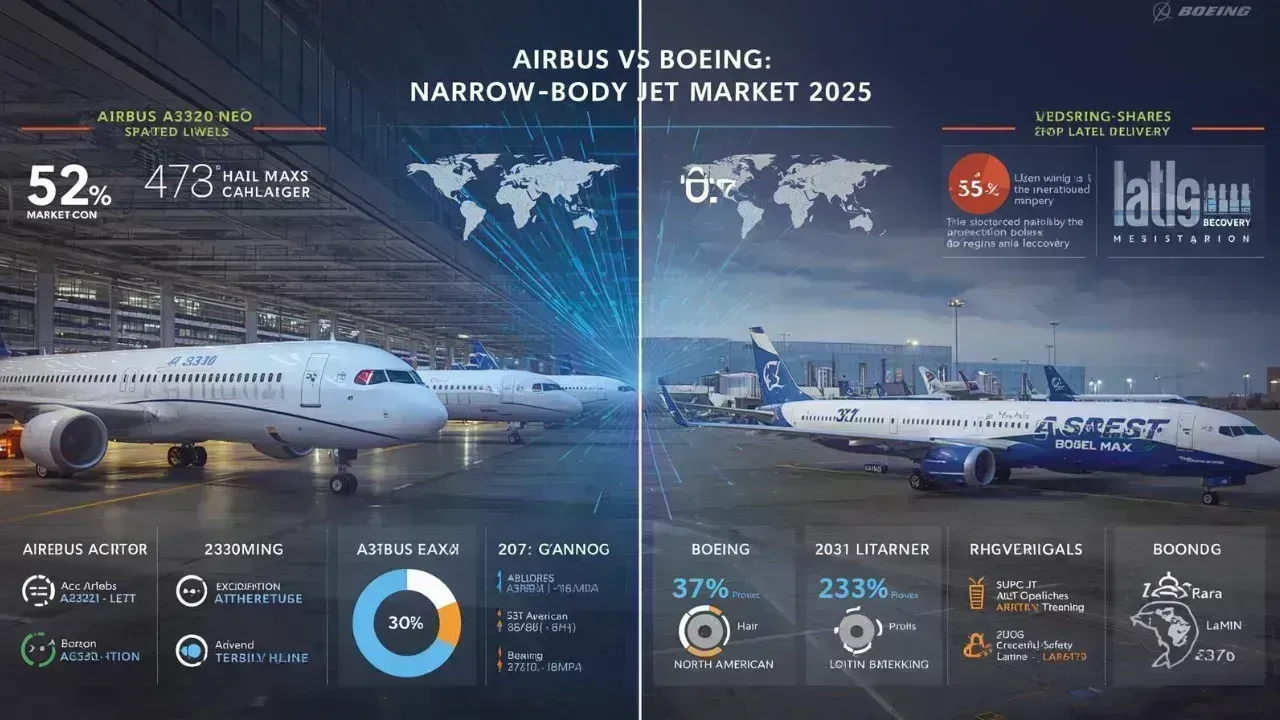
Post by : Meena Rani
The narrow-body jet segment, dominated by Airbus and Boeing, is the cornerstone of global commercial aviation. Aircraft such as the Airbus A320 family and Boeing 737 series serve short- to medium-haul routes, making them essential for airline operations worldwide. Competition in this segment is intense, with both manufacturers striving to gain market share through innovation, efficiency, and strategic partnerships.
Narrow-body jets account for over 60% of commercial aircraft deliveries globally. Airlines prefer these aircraft due to their versatility, fuel efficiency, and suitability for high-frequency routes. The market is characterized by:
The Airbus A320 family, including the A319, A320, A321, and the latest A321XLR, is a highly successful line of narrow-body jets.
With thousands of aircraft delivered worldwide, the A320 family continues to dominate in terms of orders, driven by strong demand for the A321neo and A321XLR variants.
Airbus has incorporated fuel-efficient engines, sharklet winglets, and digital avionics to enhance performance and reduce operating costs. The A321XLR’s extended range allows airlines to operate routes that traditionally required wide-body aircraft.
Major airlines in Europe, North America, and Asia rely heavily on the A320 family for their fleet modernization programs, emphasizing efficiency, passenger comfort, and flexibility.
Boeing’s 737 series, particularly the 737 MAX family, remains the primary competitor to Airbus in the narrow-body segment.
The 737 MAX has recovered from previous grounding issues, regaining customer confidence with enhanced safety features and fuel efficiency. Boeing continues to secure significant orders from global carriers.
Boeing has focused on engine upgrades, aerodynamic refinements, and advanced avionics for the 737 MAX, improving fuel efficiency and extending range for select variants.
Airlines in North America, Latin America, and parts of Asia are loyal to the 737 series due to fleet commonality, proven performance, and robust service support.
Airbus and Boeing employ different strategies to capture market share in narrow-body jets:
Airbus has increased A320 production rates, including ramp-ups for the A321XLR, while Boeing continues to expand 737 MAX output after resuming deliveries post-grounding.
Airbus emphasizes extended-range variants and digital integration, while Boeing focuses on engine efficiency, avionics upgrades, and safety enhancements.
Airbus has gained a slight edge in Europe and Asia, while Boeing maintains dominance in North America and key global partnerships.
Order backlogs, delivery schedules, and pricing strategies play critical roles in market share. Both companies leverage customer loyalty programs and flexible financing to secure long-term contracts.
The narrow-body segment will continue to grow as global travel demand increases, particularly in emerging markets. Key trends shaping the competition include:
Airbus and Boeing are developing new models with enhanced fuel efficiency, lower emissions, and digital integration to meet evolving airline requirements.
Strict emissions targets push manufacturers to innovate engines, materials, and operational efficiency to reduce carbon footprints.
Air travel recovery post-pandemic and growth in Asia-Pacific and Latin America will heavily influence market share and production strategies.
The battle for market share in narrow-body jets is a defining contest between Airbus and Boeing. Airbus leverages the A320 family’s extended range and digital integration, while Boeing capitalizes on the proven 737 series and MAX improvements. The competition drives innovation, efficiency, and choice for airlines worldwide, ultimately benefiting passengers and shaping the future of global aviation.
#NarrowBodyJets #AirbusA320 #Boeing737MAX #AviationIndustry #MarketShare #AircraftInnovation #AirlineEfficiency #FleetModernization #A320neo #737MAX #AerospaceNews #AviationCompetition










Advances in Aerospace Technology and Commercial Aviation Recovery
Insights into breakthrough aerospace technologies and commercial aviation’s recovery amid 2025 chall

Defense Modernization and Strategic Spending Trends
Explore key trends in global defense modernization and strategic military spending shaping 2025 secu

Tens of Thousands Protest in Serbia on Anniversary of Deadly Roof Collapse
Tens of thousands in Novi Sad mark a year since a deadly station roof collapse that killed 16, prote

Canada PM Carney Apologizes to Trump Over Controversial Reagan Anti-Tariff Ad
Canadian PM Mark Carney apologized to President Trump over an Ontario anti-tariff ad quoting Reagan,

The ad that stirred a hornets nest, and made Canadian PM Carney say sorry to Trump
Canadian PM Mark Carney apologizes to US President Trump after a tariff-related ad causes diplomatic

Bengaluru-Mumbai Superfast Train Approved After 30-Year Wait
Railways approves new superfast train connecting Bengaluru and Mumbai, ending a 30-year demand, easi